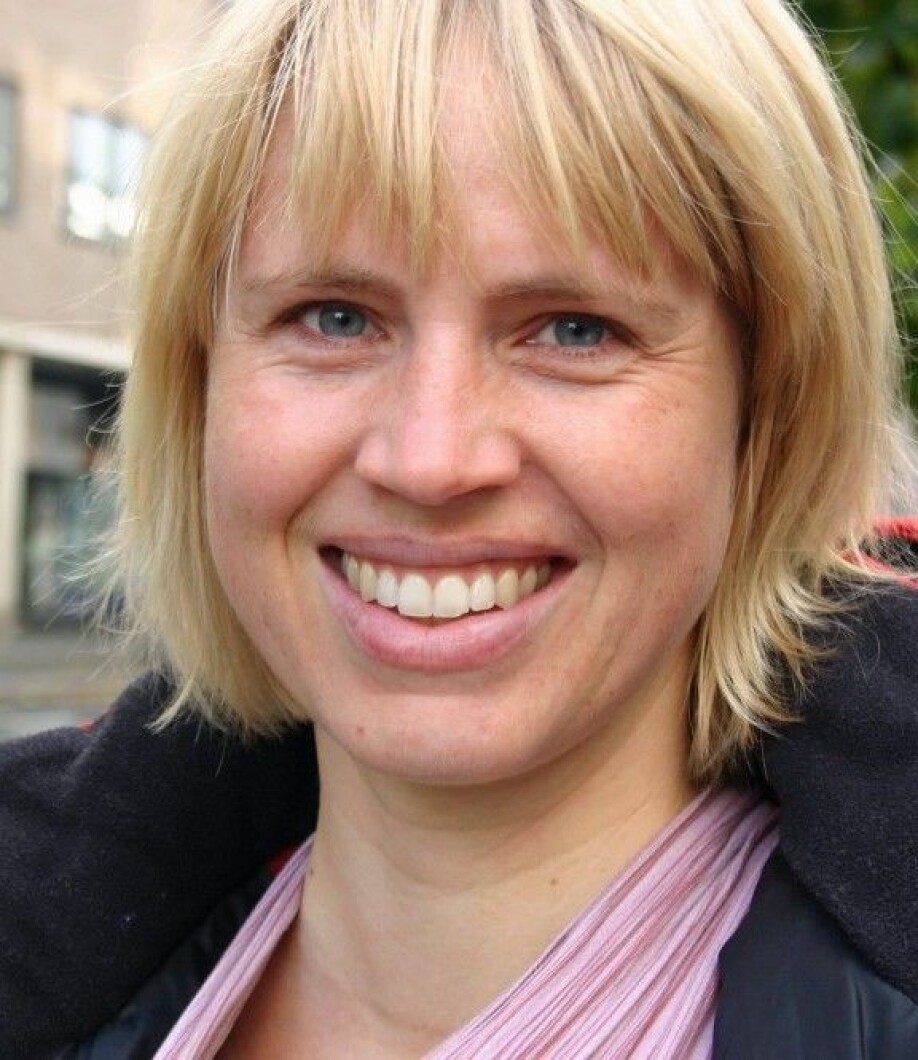
Why do parents in one of the world's most gender equal countries still give children their dad's surname?
It's a romantic gesture, claims one researcher. "Men take their surnames for granted", says Line Førre Grønstad, who recently defended a doctoral dissertation on the topic.
Parents have to consider numerous things when choosing their children’s last name.
Is there a father-in-law who could get upset, a strong link to a family farm name or a desire to pass on the family name?
Do parents want to give the child a fine-sounding name, or a name that’s particularly distinctive or one that can be easily pronounced in another language?
A new doctoral dissertation shows that parents in Norway today usually give their children the father's surname. Why is this still the case in one of the world's most egalitarian countries?
Out-of-date data on children's surnames
Little recent research has been done on the choice of surnames for children in Norway.
Statistics Norway last investigated the issue in 2003, when they asked more than 6000 men and women about the choice of surnames.
At that time over 70 per cent of both men and women thought it was best for children to take the father's last name, either alone or with the mother's last name as a middle name. Only one in a hundred thought that the child should take just the mother's name.
But these figures are from 2003. How would people respond now? Have Norwegians become more egalitarian in choosing names?

It turns out that “most people still believe that the father's name should be the surname,” says researcher Line Førre Grønstad.
Two surnames, with the husband’s last
Grønstad recently defended her doctoral dissertation on men's choice of surname, both for themselves and for their children.
She asked questions about men’s attitudes regarding the children's surnames.
About half of the men thought the children should have both the mother and the father's surname. Twenty-one percent felt the children should take only the father’s name, and two percent felt they should take the mother’s name.
Of the respondents who supported children having both names, 28 per cent thought the father’s name should come last - meaning this would be the main surname, while the mother's surname would have status as a middle name. Two percent thought the main surname should be the mother’s.
The rest of the respondents replied that it didn’t matter to them or that they weren’t sure.
Most women also felt that the child should take the father's name rather than the mother’s. If the child was given both names, women also believed that the man's name should be the main surname.
Women still taking husband’s name
When men and women marry, women still more often take the man's name than vice versa. Grønstad's survey from 2018 shows that four per cent of men take their wife’s surname, compared to 47 percent of women who take their husband's name.
Gender researchers and social scientists point to several reasons for this.
For example, women consider it more important for all members of the family to have the same name, and so they change their name as a romantic gesture of commitment to the man.
Declaration of love
Hanne Haavind, a former professor of psychology at the University of Oslo, believes this to be true.
“Changing your surname is a way to declare your love and contributes to strengthening the bond between partners,” she says.
Haavind believes that taking the man's last name has become something that women consciously decide to do.
“The man can’t demand it, so when she chooses to change her name, she’s emphasizing the importance of their relationship,” she says.
“Her name change is a gift. But by keeping her middle name and given name, she maintains her own identity at the same time.”
Haavind is also a gender researcher and published the book "The myth of the good mother" in the 1970s.
Nothing to do with gender equality
Norwegian men have become more egalitarian in many areas. They take a good part of the available parental leave, participate more in child rearing in general, do more housework than ever before and choose female-dominated occupations more often now than before.
So why are these changes not reflected in the naming realm?
“Name change is no longer perceived as a symbol that the man is the “head” and the woman subordinate,” says Turid Noack, a former senior researcher at Statistics Norway.
“Changing surnames has acquired positive values in itself. For most people, names have nothing to do with gender equality,” she says.

Apolitical milestone
Noack was one of the researchers involved with Statistics Norway's 2003 name survey and conducted group interviews afterwards.
She says changing one’s name at that time was about several things.
“Changing surnames was important for many women because it represented a milestone. Now they were beginning something new. In the interviews, women also felt that everyone in the family should have the same name.
Noack concludes that the name change was more about marking the transition to marriage from lover or cohabitant status, rather than anything political.
“Changing your name isn’t connected to women's rights for today's young people. They don’t link name change with the struggle for equality,” she says.
Even the decision itself affects choice of name
Grønstad wonders why men don’t think along the same lines as women.
“If the idea is to show your love or to make it clear that the family is a unit, then couldn’t men just as easily take the woman's surname?” she asks.
Grønstad believes that one of the reasons why men’s surnames are used is that they get out of having to make a choice. Men take their last name for granted.
She calls it men's privilege not to have to make naming decisions, since the default pattern tends to be that children will get their father’s name.
“Men don’t think that much about it. The idea of changing names doesn’t exist for men, but it does for women. We all know someone who’s taken the husband’s name,” says Grønstad.
“Name change also reflects cultural pressure. Men are seen as carrying on the family line,” she says.
Much of identity related to last name
Names have a lot to do with identity, according to Grønstad.
“A lot of people experience having an inner identity from the time they’re little until they die. Their identity becomes a kind of core version of the individual. And identity is often linked to one’s name, so changing names can feel like changing your identity,” Grønstad says.
For example, if the woman keeps her own name in the marriage, it may be easier for her to relent when it comes to naming the children.
“Some women choose to take on the fight to keep their own name and can’t muster the strength to take on the fight for their children’s names,” Grønstad says.
She also points to role models: Women see role models who most likely have let their husband’s name be used for the children – like mothers, mothers-in-law, grandmothers, aunts and friends.
Families' choice
Shouldn’t people be allowed to choose for themselves how to name their children, without worrying about what is egalitarian or politically correct?
Grønstad believes that families must be allowed to make their own choices.
“Maybe you have a father-in-law who’ll be really upset if his name doesn’t continue. Or you have a name that’s too special, not special enough, or that contains Norwegian letters like æ, ø or å that don't work in English. Maybe the name originated in a special place, which makes it even more connected to a sense of identity,” she says.
Nevertheless, the researcher believes that the choices women and men make about their children's surnames follow a certain tendency.
“Choosing surnames is one of the little things that indicates we still have a way to go when it comes to gender equality. This doesn’t mean that the individual who makes the most common choice is mistaken. But naming becomes problematic when it gets so systematic. Men and women then don’t really have the same opportunity to choose, even if they have it legally,” she says.
Most gender equal solution
Grønstad's survey studies attitudes and tells us a lot about how women and men think about name changes. In an additional survey, she found that almost half of the women took the man's surname, while four per cent of the men changed to their wife's surname.
But none of the surveys ask how many children have been given either their mother's or father's surname.
The available information about children's surnames today comes from Statistics Norway's annual name survey. The figures from 2019 show that eight percent have hyphenated surnames.
The hyphen solution is the most gender equal solution in addition to creating a completely new name, according to Grønstad, because then both surnames and have equivalent standing.
When will things change?
Grønstad believes things are changing.
It seems that now more women are keeping their surname than previously. In this regard, the change is greater among the ladies than among the gents.
Grønstad is married and has taken her husband's surname as her middle name, and he has taken her last name as his middle name.
“He hadn’t really thought that much about it, but he quickly realized that this was important to me,” says Grønstad.
“Both our names are similarly common, and we have similarly strong connections to them.”
It took some coin tossing to decide what the children should be called.
In the end, the older child was given Grønstad’s last name, and the younger child was given Grønstad’s husband’s name. In other words, the family's four members are named either Førre Grønstad or Grønstad Førre.
Translated by: Ingrid P. Nuse
References:
Line Førre Grønstad: Fellesskap og individualitet - Kjønna etternamnsval blant norske menn i heterofile parforhold. Doctoral dissertation at the University of Oslo, 2020.
Colleen Nugent: Childrens’s surnames, moral dilemmas: Accounting for the Predominance of Fathers' Surnames for Children. Gender and Society. 2010. Summary.
———
Read the Norwegian version of this article at forskning.no































